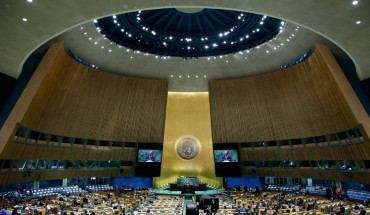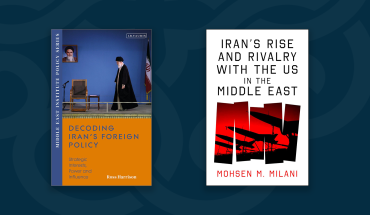The panel discussion "Israel's Evolving Foreign Policy" took place at the 60th annual conference in November, 2006.
Israel's Evolving Foreign Policy
Event Featuring:
Geoffry Aronson, Daniel Levy, Yoram Peri, Daniel Seidmann, Ian Lustick
Overview
This panel reviewed the current state of Israel's foreign policy in light of recent political developments, including the July conflict in Lebanon and the results of the 2006 US interim elections. Much of the discussion concerned the effects of American foreign policy on Israel, and vice-versa and a general call for pragmatism over ideology was put forward. Special attention was also given to settlement policy and the division of Jerusalem. A recurring theme was the importance of Israeli re-engagement in the peace process, in the absence of which the panelists predicted a severely degraded security situation, both internally and externally.
Event Summary
The panel began with Yoram Peri positing that foreign policy in Israel is almost exclusively driven by domestic policy. He described the Ministry of Foreign Affairs as having a marginal influence on foreign policy relative to the Prime Minister and the Ministry of Defense. As a result, the defining factors in matters of foreign policy are security concerns, with the Defense Minister usually taking the lead role. Thus, the Israeli generals are able to exert a significant degree of influence on the country’s policies and directions. Peri was careful to note, however, that the Israeli military is not exclusively a proponent of war and has used its influence to support the peace process when it is pragmatic.
Geoffrey Aronson expanded on Peri’s comments, addressing the current power vacuum in the wake of the recent Israeli conflict with Hezbollah in Lebanon and its subsequent effects on Israeli policy towards Gaza and the West Bank. Aronson expressed his conviction that the direction of Israeli policy can only be changed by determined effort from the top. Given that Prime Minister Ehud Olmert’s current focus on Iran has superseded Gaza and the West Bank on his agenda, there seems to be little hope for positive change in the immediate future.
Aronson identified the belief that separation equals security as the driving force behind Israeli policy towards the occupied territories. Despite IDF opinion that West Bank settlements were not necessary to ensure Israeli security, Aronson described recent settlement expansion and the unequivocal protection of settlers’ interests at the expense of neighboring Palestinians. Separation has been achieved through the construction of fences around individual settlements, the geographic distribution of roads and the security barrier wall, creating substantial obstacles to Palestinian movement. Meanwhile, the unrestricted movement of the IDF has impeded Palestinian security services from functioning effectively. Only when Ariel Sharon presented the settlements as a liability was it possible to challenge settlement policy. Aronson emphasized that the absence of a similar policy under P.M. Olmert means the current situation will only worsen.
Daniel Levy’s address took the form of an imaginary letter from a retiring Israeli diplomat to P.M. Olmert. His letter illuminated several somber challenges that Israeli foreign policy must take into account. First, he cited a number of Pew statistics that indicate a greatly diminished American standing in the world, presented in light of an increasing Russian and Chinese presence in the Middle East, Central Asia and Africa. Levy questioned the wisdom of the close alliance between the US Christian evangelicals and right-wing Israeli nationalists, as well as ties between US neo-cons and Israeli Likudniks. Given the results of the 2006 US interim elections, he suggested that it might behoove Olmert to forge ties with some moderate elements, particularly within the US Jewish community. Levy concluded with an emphatic reminder of the current realities of Middle Eastern affairs; the situation can no longer be described as “business as usual.” Given the rise of extremism, he insisted that if Israel does not re-engage in the peace process, war is inevitable.
Daniel Seidemann restricted his comments to Jerusalem, describing some current trends in policy that reduce the conflict over the city to its “volcanic core.” He detailed the resumption of settlement activity in and around the old city, explaining that during the past two years almost every single historic, national, religious and archaeological site has been turned over to extreme settler organizations. He described these actions as “voluntary detonators of any political process.” According to Seidemann, the challenge is to find a way to create a space where three mutually incompatible religious narratives and two mutually exclusive nationalist narratives can exist in the same secular and religious space. He concluded by reminding the audience that preventive measures are far less costly, and often more effective, than corrective ones.
Moderator Ian Lustick closed with some of his own insights, beginning with a description of Israel’s historical “Iron Wall” policy wherein a strong show of force is followed with a move to peaceful compromise. Since peace negotiations have repeatedly faltered, Lustick questioned the policy’s viability amidst the current state of affairs. He also pointed out that the policy has, in effect, cut Israel off from the rest of the Middle East and has caused its Muslim neighbors to abandon any optimism that it could ever be integrated into the region. In the eyes of its neighbors Israel is little more than a post-World War II colonial fragment reminiscent of South Africa, French Algeria and Rhodesia. In light of the eventual collapse of those colonial outposts, the assumption is that it is only a matter of time before Israel does the same.
Lustick blamed US policy for having “wrapped a cocoon of political and economic support around Israeli democracy.” Subsequently, Israel’s actions are unduly detached from their consequences. Without unabashed US protection in the UN, Israel would be forced to operate in “the real world,” causing the conflict to move beyond both Israeli and US control.
About this Event
This brief is based on a panel discussion by Geoffrey Aronson, Daniel Levy, Yoram Peri, and Daniel Seidemann presented as part of the Middle East Institute's annual conference at the National Press Club in Washington DC, on November 14, 2006. Ian Lustick served as moderator.
Attributions
This summary was written by Isaac Morrison, an intern in the Sultan Qaboos Cultural Center at the Middle East Institute. He has traveled extensively in Israel, and recently graduated from the University of Maryland in College Park with a B.A. in Cultural Anthropology focusing on the Middle East. Alex Maass, a Publications Department Intern, served as peer-editor for this event summary. Alex is a graduate of Amherst College with a B.A. in Middle Eastern History and French Language and Literature.












